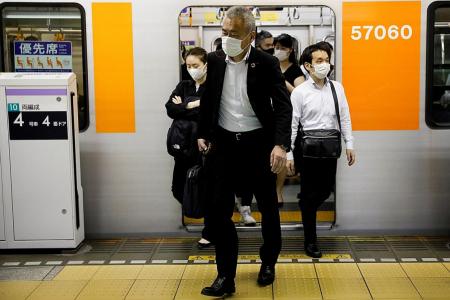Japan’s ‘mosh pit’ trains raise fears of resurgence in infections
TOKYO: As Japan returns to work from coronavirus restrictions, its notoriously crowded trains - almost a symbol of its celebrated work ethic - are raising fears about a resurgence of infections.
The authorities in Tokyo had hoped to solve the problem of crowded commuting with staggered hours and remote working, but the trains appeared almost back to normal yesterday, days after the lifting of a coronavirus emergency.
Health experts and politicians have blamed night spots and concert venues, known as live houses, for cultivating clusters of infection and have advised them to stay closed. But while no cases have been linked to trains, many Tokyo residents say they are just as packed.
"It's such a contradiction that crowded trains are okay but live houses still can't open," said Twitter user Rimiken. "Crowded trains are like a music festival. They're a festival mosh pit."
Tokyo recorded 34 new infections on Tuesday, the highest daily increase since early May.
The Tokyo Metro is taking steps to prevent infections with open carriage windows and the disinfecting of ticket machines, spokesman Hisao Asano said.
But it has no plan to limit passenger numbers or insist on spacing, he said.
A study by one of Japan's top research institutes indicated it may have to. The Riken Centre for Computational Science found that even with open windows, the air flow concentrated above passengers' heads on crowded trains.
Government infection expert Shigeru Omi said crowded trains could no longer be an everyday reality.
"The train is the symbol of Japanese workaholic society," Mr Omi told reporters. "This is an opportunity for Japan to address this issue of overcrowded trains by, first of all, staggered working hours and remote work."
Meanwhile, the government's huge stimulus package has come under fire from restaurant owners for channelling funds for items like wagyu beef, melons and tourism rather than accelerating help for firms with burning cash needs.
The government's subsidy list includes items such as five-star sirloin Kobe beef steak, which costs about US$37.20 (S$52) for 100g, and top-quality Yubari melon that sells for more than US$90 a 1.6kg fruit. - REUTERS
Get The New Paper on your phone with the free TNP app. Download from the Apple App Store or Google Play Store now



